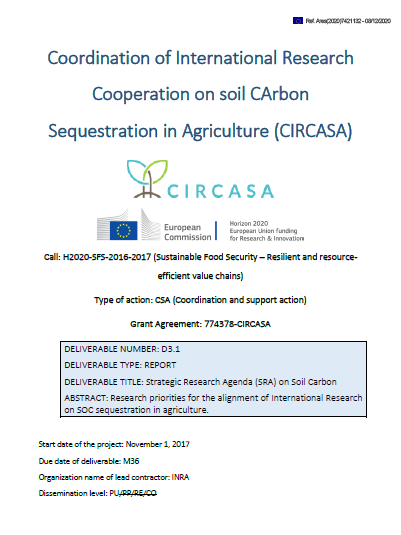Synthesis Report on Knowledge Demands and Needs of Stakeholders
- Publication
- Citation
CIRCASA 2020. Deliverable D2.3: "Synthesis report on knowledge demands and needs of stakeholders". DOI: https://doi.org/10.15454/Q0XVVD
Soils matter: We depend on soil health for our food and their condition is also closely linked to our ability to respond to the climate crisis. World soils contain a stock of about 1,500-2,500 gigatons of organic carbon, which is more than three times the amount of carbon in the atmosphere. Their degradation entails the risk of emitting large amounts of carbon, as well as undermining both soil fertility and food security. At the same time, sustainable management of soils can sequester carbon, while simultaneously supporting valuable ecosystem services and food security.
Scaling up climate smart soil management requires addressing a range of barriers, with one of the key barriers being the availability and access to the right kind of knowledge. A new report from Ecologic Institute, prepared under the CIRCASA project, shows the importance of empowering farmers and other stakeholders through effective knowledge creation and exchange.
Drawing on extensive stakeholder consultation across the globe, the report shows that farmers require knowledge that answers two overall questions concerning soil carbon sequestration – "What's in it for me?" and "How do I get there?". Farmers need information on the benefits, risks, trade-offs and time effort linked to improving soil organic carbon levels. They furthermore require guidance on specific management practices (e.g. on the types of covers and catch crops that are most likely to provide the best overall benefits and how to integrate these into their systems). Non-farming stakeholders expressed a need for more knowledge societal benefits, effective financing options and monitoring, reporting and verification methods (MRV).
Importantly, while more research is certainly required in some areas (e.g. MRV), the report finds that the access to existing knowledge is a key area of concern in other areas (e.g. farm-level management). To improve access to knowledge and develop tailored context-specific guidance for farmers, innovative forms of knowledge creation and exchange need to complement traditional top-down approaches. Specifically, participatory forms of knowledge (co-)creation and exchange, which involve farmers in the research process, and therefore in defining the research question and in the collection of data, are promising. Examples are so-called living labs and the crowdsourcing of information.
To take these insights forward, the CIRCASA project is developing a strategic international research agenda to encourage further research on soil carbon sequestration and to pursue the question of how to create (research) infrastructures, which facilitate regionally applicable insights and exchange.
